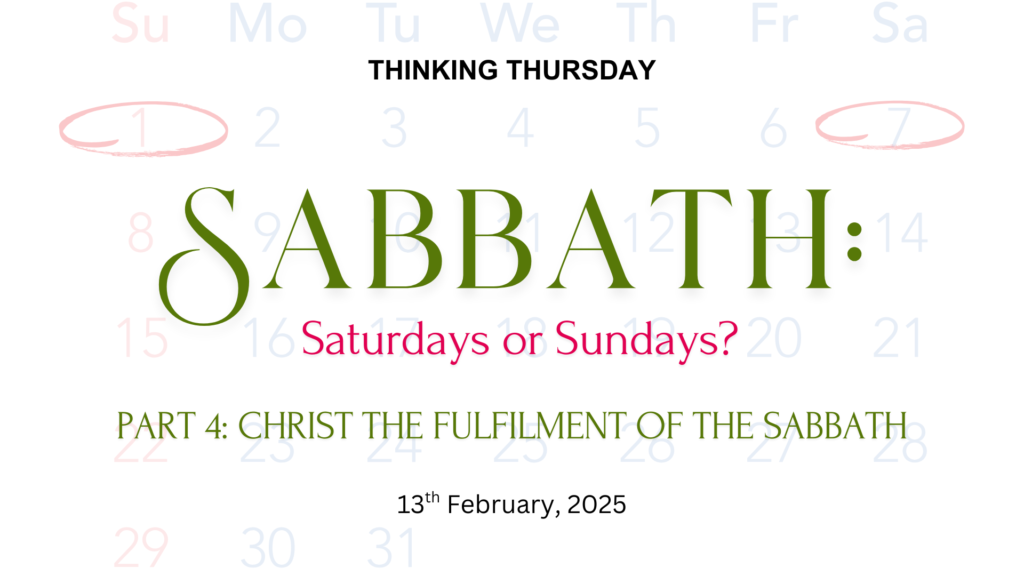CHRIST: THE FULFILMENT OF THE SABBATH
The Fulfilment of the Sabbath
In the last part, we saw that the observance of the Sabbaths under the law was a prophecy which the Lord Jesus came to fulfil, and we are meant to recognise and identify them.
Now, let us consider the fulfilment(s) of the Sabbath through the teachings and acts of our Lord, Jesus.
READ ALSO: DRESSING
Major Sabbath Seasons
To understand the fulfilment of the sabbath, we have to understand first the major sabbath seasons under the law. They are the Passover, Pentecost, and Tabernacle (Lev 23:4-5, 15, 34).
These feasts are also God’s appointed seasons, and they come around every year. We haven’t been taught much about this, largely due to our disconnect from our Jewish spiritual ancestors – Christianity itself. There has been a long disconnect and the Church has not always followed the same path it did in the time of the apostles.
READ ALSO: SPIRITUAL WARFARE
A Detour into Church History
For nearly 20 years after Jesus died, all Christians were Jews. The 3,000 people who were saved on the day of Pentecost (Acts 2:41) were primarily Jews who came from many different places to celebrate the feast. The first time Gentiles were officially brought into the Church was when Peter preached in the house of Cornelius (Acts 10:44-47). That’s when Peter declared, “God has chosen to give the Gentiles this gift also” (Acts 11:17).
It was normal for Jews to travel to Jerusalem to celebrate the feasts. God commanded, “Three times you shall appear before me, every male” (Exodus 23:17). Jews would travel from wherever they lived to Jerusalem, the place God had chosen to place His name (Deuteronomy 16:16). This practice continued for a long time. So, when we read the New Testament, we are reading writings from Jews. While the Gospel began among the Jews, it eventually reached the Gentiles, but this took time. Jesus had told His followers, “Take the message first to Jerusalem, Judea, Samaria, and then to the ends of the earth” (Acts 1:8). Because they didn’t immediately obey, God allowed persecution, and the believers scattered. As they went, they preached, and that’s how the Gospel spread (Acts 8:4).
When Paul went to different cities, he would visit the synagogues to preach (Acts 17:2, Acts 18:4). In Romans 1, he writes, “I am not ashamed of the gospel of Christ, for it is the power of God to salvation for everyone who believes, first for the Jew and then for the Greek” (Romans 1:16).
Why is this important? We often miss the connection, but everything we read in the Bible is rooted in these appointed times and seasons. We didn’t just pull this out of thin air—everything is right there in Scripture!
READ ALSO: FUTURE TELLING
Passover
During that Passover feast the Lord Jesus died was when He acquired rest/peace/freedom/deliverance for our spirits. There was a harvest of believers during and after this time.
Pentecost
50 days later, with the sending of the Holy Spirit, he achieved the same goal and acquired us rest for our souls/minds. Cowardly disciples received boldness and help in their souls while celebrating Pentecost. There was a much greater harvest of souls now and thereafter.
READ NEXT: SABBATH: SATURDAYS OR SUNDAYS? (PART 5)
Tabernacles
This greatest of feasts is yet to be fulfilled. When the Lord will walk among us and dwell with us (2 Corinthians 6:16). There will be the greatest harvest the world has ever known.
Until the next part, ponder why we need to know the symbolism. It’s obvious.
Watch: The Church is Responsible for Many Divorces
